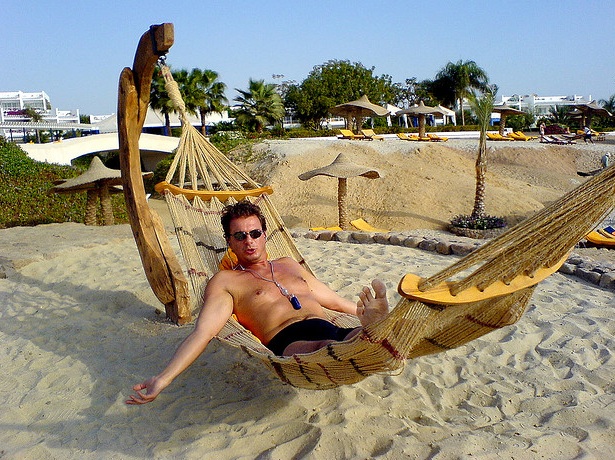 A tourist soaks up the Egyptian sun. The Middle East is getting hotter, like the rest of the world, but when is too hot, too much?
A tourist soaks up the Egyptian sun. The Middle East is getting hotter, like the rest of the world, but when is too hot, too much?
It’s hot and getting hotter. But nowhere is the more evident than in Southern Asia and the Middle East. And while daytime temperatures are always hot this time of the year in areas like the Arabian Peninsula, and the Indian Sub-Continent, recording temperatures such as 53.7 degrees Celsius (136 degrees Fahrenheit) in places like Mohanjo-daro, Pakistan.
Even European locations like the Canary Islands and Malaga Spain are recording abnormally high temperatures of 38 degrees Celsius or more, reports an article in the UK-based Guardian. A sign of global warming?
Of course, there have been even higher temperatures recorded in previous years; including one of 57.8 C in Libya in 1922. But recent recordings in places all over the world seem to indicate that the temperatures in many parts of the world are hot and getting hotter. In some countries, like Saudi Arabia, high summer temperatures are perfectly normal, and may even help boost the development of solar energy as an alternative to using fossil fuels (said to be a partial cause of global warming).
Solar energy, which works especially well in places where the sun shines more than 275 days a year is a natural in Middle Eastern countries where sunny weather is virtually guaranteed for more than 330 days a year. Look at the weather charts on the TV which forecast: Sun, Sun and more Sun.
But despite media reports on solar energy plants being constructed in the Middle East, and current plans to construct a number of solar energy panel array farms in Egypt, in the Persian Gulf region and Saudi Arabia, nearly all the electricity currently being produced in these locations is still by conventional power plants that run on heavy fuel oil.
During last December’s COP 15 climate change conference in Copenhagen, one of the topics discussed was the future effects of climate change on Middle Eastern countries, especially Egypt, which has more than 159 metric tons of annual carbon emissions, and one of fastest growing populations in the world.
Egypt in particular has been noted as a country that is facing a severe water shortage, due to plans for the building of a large dam across the Blue Nile in Ethiopia. Egypt is now constructing a large solar thermal energy plant in the country’s desert region, about 100 KM south of Cairo. But even though the plant is projected to produce around 150 MW of electricity, this is only a small drop in the country’s energy needs bucket; with the vast majority being supplied by fossil fuels.
If the current heat waves affecting every continent in the northern hemisphere, are any indication, the world is definitely getting hotter. This phenomenon recalls a previous article on Green Prophet in which these warming trends and changing weather patterns bring to light a “made for TV” movie The Fire Next Time, that came out back in 1993.
This film gave a very unpleasant look into the consequences of global warming in the year 2017 (not too far from now); and portrayed a world suffering from massive drought, unstoppable forest fires, and giant “mega storms” such as Hurricane Katrina that hit New Orleans and other parts of the US Gulf Coast in 2006.
The effects of global warming, as portrayed in this film, had turned most of Continental America into a parched desert. In such a scenario, one can only imagine what would be in store for other parts of the world – especially the Middle East.
Regarding the situation in Pakistan, with the searing temperatures noted earlier in this article, people can only cope with this problem as noted by M. B. Kalhoro, a local correspondent for Dawn.com, an online newspaper: “It’s very tough. When the power is out, people just stay indoors all the time.”
Image via __DODO
Read more on climate change:
Middle East and the Copenhagen Climate Change Summit
TV Sci-fi Movie Predicts Results of Global Warming
Yemen To Soon Have World’s First Waterless Capital



